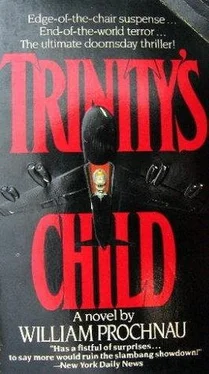The boy stared at the crumbling home of the beetle and the pitch. It was truly a miracle to build a fire in the rain, to create warmth in the cold, and his father had done it. But he could no longer give his pa any satisfaction in the woods.
“Nope,” the kid said quietly. “It’s gonna rot away and be gone. Just like you, Pa. Just like me.” The father looked at the son as forlornly as he could show, because he knew that somehow he had driven the dreams out of the kid—that the boy, barely turned twelve, no longer saw the past or the future. He only saw the present, and that truly was sad, even to Big Kazakhs.
“Oh, yer right about that, bub,” his pa said. “But yer wrong too. Don’t know if yer ever gonna unnerstand.”
Polar Bear One passed into Canada east of Penticton, droned north over the Caribou Mountains of British Columbia, and sliced across the corner of Alberta on a course toward the two immense frozen lakes of the Canadian Northwest Territories, Great Slave and Great Bear. The next hour passed more rapidly than any of the crew expected. PRP cluttered their lives with chores, leaving little time for inward trips, those being risky.
Kazakhs picked up a few radio transmissions from other aircraft, all civilian, most of the calls coming on the emergency frequency but none of them coded JIMA 14, the B-52’s identification for military emergencies. Most were only marginally coherent and Kazakhs answered none. He received no military communications and he slapped a total ban on listening to ground radio. He did not need any more Crazy Eddies or Conway Twittys, and surely not from Coquille.
Kazakhs ordered O’Toole’s body placed downstairs behind Tyler and Radnor in the little basement walkway leading to the sealed-off bomb bay. It was the only place in the small crew compartment of the huge bomber where six feet of now-excess baggage could be stowed relatively inconspicuously. Radnor came up, skittishly, to help Halupalai carry the body.
The PRP psychiatrists, had they been aboard for this ultimate laboratory test of their wisdom, would have observed Tyler with fascination. He ignored the entire proceeding. He did not draw his eyes away from his radar screen as his crewmates struggled to get the body down the ladder flanking his seat. He did not tum once to look at the corpse as it was stretched out behind him. He remained quietly unconcerned, as if the reality of one touchable body was simpler to handle than the vision of distant millions. That was the opposite reaction from the one predicted by the psychiatrists. They said the unseen millions would be more tolerable than looking death in the eye. Psychic numbing, they called it; a lesson from Vietnam that the shrinks concluded would be far more useful in the big war.
Tyler went about his business, watching his screen, charting and plotting, mouthing bland course corrections to Kazaklis. He was the perfect, efficient, no-nonsense navigator, a tribute to the system. He said nothing more about the super con of the mock destruction of his home and family, nothing more about the hoax of this most elaborate practice mission. Nor did he utter a single word indicating he had changed his mind. He engaged in no small talk with Radnor, his seatmate in the basement. He did his job. That was the beauty of PRP. It worked even when it didn’t work.
The presence of O’Toole’s body had a much more profound effect on Radnor. He found himself looking over his shoulder regularly at the placid hulk of the man he last had seen in the shower at Fairchild. O’Toole’s feet pointed toward Radnor’s back, his face hidden just beyond the bulkhead interrupting the radar operator’s line of sight toward the hatch door. So Radnor saw two V-angled boots, two legs, and the beginning of a torso. No more. The body was bathed in the plane’s red night lights, a routine red that now took on a hue of malevolence for the first time in Radnor’s career.
Tyler wasn’t helping matters either. Once, as Radnor drew his eyes back away from O’Toole’s body, he saw Tyler reach reverently forward and carefully touch the little Kodak icon he had pasted above his radar screen, one finger caressing a cherub’s cheek, another seeming to tousle the glossy image of fine blond curls. Radnor could see Tyler speaking softly, a loving incantation to the baby-blue eyes that had filled with tears on the frozen runway such a short time ago. Radnor shuddered. He wanted to scream at Tyler: Take it down, damn you. Take it down. Tyler bothered him almost as much as the nearness of O’Toole’s dead figure. The whole thing gave him the jitters, conjuring up undesirable thoughts about Spokane, Laura, and the world he had left behind forever. Radnor kept no icon of his own. He didn’t need one, Laura’s face being riveted into his mind. He sobbed briefly. Then, as trained, he called on PRP to push those thoughts back down. It was not easy. But he was kept quite busy.
Upstairs, Halupalai now occupied the rear of the topside cabin alone. Had it not been for O’Toole’s demise, Halupalai would have been the most dangerously exposed to wrong thoughts. He was the one about whom the psychiatrists—had they been perched in some dark corner of the nuclear bomber, watching, watching, as Halupalai’s mind often had envisioned them—would have been the most worried. He simply had nothing to do, being the guardian only of the remote-controlled Gatling guns 150 feet behind him in the tail. That left time to think, and thinking truly was dangerous. Kazakhs handled that problem.
“Halupalai?” the pilot asked shortly after the gunner returned upstairs. “You think you can handle O’Toole’s tinker toys for us?”
“You bet, commander,” Halupalai responded excitedly, his enthusiasm briefly running away with him. “I’ve sat next to so many O’Tooles I’ve forgotten most of their names and faces.” The sergeant immediately felt an overwhelming surge of guilt. He had forgotten many faces, but not O’Toole’s, which leaped tauntingly into his mind’s eye now. His voice trailed off. “I think I can do it, commander,” he added.
Kazakhs took no heed of the mood change. “Congratulations, Lieutenant,” he said. “You may have the first battlefield commission of this here war… or whatever the hell we’re into.”
Halupalai paused again. “I’ll take the job, commander,” he said. “You keep the bars.”
“You sunburned beach bum!” Kazakhs thundered. “Holdin’ out for captain on me, huh?”
Halupalai gazed into the blinking red-and-yellow instrument panel in front of him. Fleetingly the roar of the madding crowds echoed again, the adulation of the California girls tickled at his loins, the succession of three wives clung to his arm and then detached, the great green turf bleached into seedy car lots with overpriced Mercedeses. Twenty years ago he turned down a commission, his own quiet acknowledgment that a college degree in off-tackle slants had brought him more grief than gain.
“Holdin’ out for sergeant, commander. Don’t need the lonely burden and all that.”
Kazakhs chuckled. “You’re never gonna get ahead in this world, sarge.” He motioned for Moreau to take the wheel and, with both hands, lifted the cumbersome white helmet off his head, replacing it with a headset. In the pressurized cabin the heavy, hot helmet was necessary only at moments of risk—takeoff, landing, low-level, combat, and, of course, during the raw tension of air-to-air refueling. So Kazakhs placed it now to his left, just behind the innocently obscure red lever that armed the nuclear weapons. The plane had three such levers, one at each crew station. All three had to be pulled to activate the weapons. His hand brushed past the lever as he reached into the side pocket of his flight jacket and extracted a mangled pack of Camels.
Читать дальше












